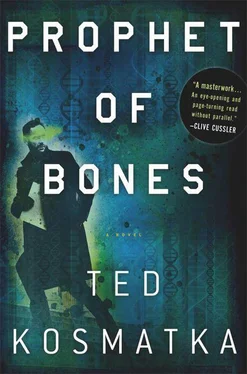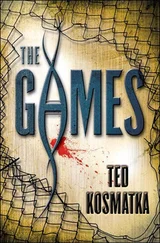“I’m sure.”
“Then this is good-bye.”
Paul stuck out his hand. Charles hesitated at first but shook it.
“What are you going to do with yourself?”
“I’m going to search for the recursive equation for human culture,” Charles answered. “And I’m going to draw.”
“Good luck to you,” Paul said.
He turned and walked down the steps. He got as far as the sidewalk before Charles stopped him, calling, “Wait, there is one thing.”
Charles disappeared back inside, leaving the door open. There were a few moments of silence, and then the sound of ripping paper. Paul walked back up the steps.
Charles returned and handed Paul one of the finch drawings. “On the back,” he said.
Paul turned it over and saw a phone number and address.
“It’s a computer guy,” Charles said. “He costs money, but he’s good at what he does.”
“Which is what, exactly?”
“What you need.”
“Thank you, Charles.” Paul shook his hand again and walked back to his car.
Morning began with coffee, thick and black. Then toast and three eggs. On the way to work, Paul drove through the steady, desultory rain of Baltimore.
He found one of the third-floor secretaries at her desk.
Be careful of Janus, Charles had said.
“Where do the bones go when we’re done with them?”
Ms. Bratton looked up from her computer monitor. The question had startled her out of her normal morning routine. “Several different facilities.”
“Is there a way to get a list?”
“Not that I’m aware of.”
“There must be a master list.”
“Perhaps you should ask your immediate superior.”
“Thanks.”
Paul swung by his office and pulled a random stack of papers from his filing cabinet. He took the elevator down to first-floor shipping. It was at the back of the building. Samples came in and went out, a steady turnover from and to all points of the globe. If the fifth floor was the company’s brain, shipping was its endocrine system.
The head shipping guy’s name was Rob.
Paul had seen him around but had never talked to him.
Paul knocked on the door. The man looked up from his computer.
“Can I help you?”
Paul waved the stack of papers. “Yeah, I think there may have been a mix-up, and I just need to double-check.”
“What seems to be the trouble?”
“I have some samples that apparently never got to where they were supposed to go. Is there any way you can track them down?”
“Sure.” The man tapped out a quick pattern on the keyboard. “You got tracking ID numbers?”
Paul shuffled through the pages in his hand. “Somewhere…” He made a performance of scanning the papers, slowly sifting through the pile in his hands, until he was back at the beginning again. Eventually, Rob lost patience.
“Where were they going?” he asked.
“They were headed out for archiving. They came out of the fourth floor.”
“Animal bones?”
“No, human mostly.”
“Oh,” Rob said. “That’s easy. Most human remains get sent to the Field Museum, in Chicago.”
“Oh, right, I remember now,” Paul said. “That is where they were supposed to go.”
“When did you ship them out?”
“Two or three days ago.”
“Well, that explains it,” Rob said, taking on a whole new demeanor. “They wouldn’t even have arrived yet. It takes four or five days to get there sometimes.”
“Oh, sorry about that. I didn’t realize.”
“If the samples still haven’t showed up in a week, then drop back by.”
“Okay, thanks.” On a hunch, Paul asked Rob another question: “Do we have anything shipped from a place called Axiom?”
“Axiom, Axiom.” Rob checked his screen.
“A Florida address,” Paul said.
“No, nothing shipped in from Axiom.”
“Thanks.”
“But we do ship things to Axiom.”
“We do?”
“In fact, we have a shipment going out now. Right in the next room.”
“Thanks.”
Paul entered the shipping room. Great stacks of crates and boxes were spread over the concrete floor. On a steel table in the back, he found a box labeled “Axiom.”
He grabbed the X-Acto knife sitting on the table and cut the tape. The box opened, revealing a dozen neatly sliced bone samples wrapped in plastic.
Paul reached in and took one out. He slipped it into his pocket and then taped the box shut again.
Paul headed for the elevators. “Thanks,” he called out to Rob as he passed his office. “You were a big help.”
Paul pulled up to the curb and put his Matrix in park. He looked down at the address written on the back of the finch drawing, then back up at the old building. The numbers on the wall read 2213, in raised black letters. Paul glanced up and down the block. This wasn’t the greatest of neighborhoods but, for better or worse, he was in the right place.
He climbed out and ascended the short riser of cement stairs. A car horn blared in the distance. From a window across the street wafted music, all bass.
This part of Baltimore was all two- and three-flats. Architecture dating to the turn of. Bricked like brick was free back then.
The place might have once been nice. Now graffiti marked the walls, drawn on top of old graffiti in layers like archaeological strata. They were a few city blocks from the water, on the wrong side of the bridge.
It seemed an unlikely place to find a computer specialist. Even an illicit one who worked for cash under the table.
Paul hit the buzzer twice before a voice came on: “Yeah?”
“I’m the guy who called earlier.”
“Who?”
“We talked.”
“That’s a little vague.”
“Charles sent me.”
A few seconds of silence. “That’s specific enough. Come on up. Third floor.”
The door buzzed.
Paul took the stairs two at a time.
At the top and around the bend, a young face leaned out from a doorway.
“In here,” the face said, then disappeared inside.
Paul followed through the open doorway.
“Close it behind you.” The voice came from somewhere in the living room.
Paul closed the door and stepped farther into the apartment.
The guy was pale with shaggy black hair and dark eyes. He was thin to the point of undernourishment, mid-thirties, good-looking, with a sharp profile and a narrow, boyish face. He sat on a ratty couch, a box of pizza sprawled open in front of him. He wore a black leather jacket, even though it had to be close to eighty degrees in the room.
“Oh, and did you lock it?”
“Uh, no,” Paul said.
“Go ahead and lock it.”
Paul went back and slid the bolt.
“You never know around here. You want some pizza? Giordono’s.”
“No, I’m good.”
“Well, here, take a seat.” He gestured with a slice of pizza toward a chair next to the TV.
Paul sank into the chair.
“I don’t mean to be rude,” the guy said. “But I’m starving. Absolutely starving. First chance I’ve had to eat all day. You don’t mind, do you? Giordono’s got the best pepperoni in town.” The words came in quick bursts, like machine-gun fire. He spoke twice as fast as a normal person.
“No, it’s fine,” Paul said. “Eat away.”
“I was at the doctor today for, like, three hours—psoriasis, the bane of my life—and they had me filling out these forms, because it was my first time there.” He took a bite of pizza, barely stopping for breath. “And you know those boxes you’re supposed to check, the ones that list you had this and you had that?”
“Uh, not really.”
“The paperwork when you first see a new doctor. There’s a clipboard, and a sheet of paper with a list of every disease in the world.”
Читать дальше












